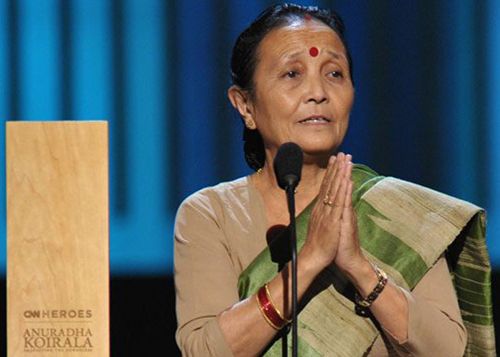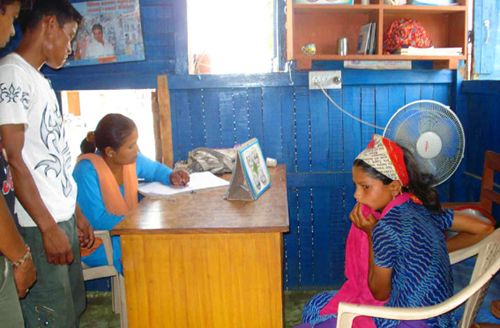When Anuradha Koirala was declared “CNN Hero of the Year 2010” last December, it made headlines in Nepal. At a time when the country was getting a bad press for its lingering political crisis, the international recognition of a Nepali brought smiles to thousands of faces. Koirala, who runs the organization Maiti Nepal in Kathmandu, won the title for her work as an activist fighting to stop the trafficking of women and girls in Nepal, a problem that has been gnawing at the very existence of the Himalayan country for decades now.
Last month, Anuradha Koirala was honored by the Nepali Women’s Global Network during an event in Springfield, VA. “There is nothing you can completely eradicate from the world. But what we can do is make an effort to prevent the problem in the first place,” said Koirala, stressing her organization’s commitment to rescue vulnerable Nepali girls who are trafficked to India and the Middle East.
Koirala, who worked as a teacher in Nepal, is a survivor of domestic violence. In 1993, she started Maiti Nepal by saving up from her meager $100 monthly salary. Since then, her organization has become a bulwark in the fight against sex trafficking, most importantly by providing rehabilitation opportunities to thousands of victims of trafficking. Koirala’s organization has helped over 12,000 abused women and girls since it first started, many of whom now work with her in the fight against what she calls “the most heinous crime in the world.”
The horrors of sex trafficking are striking. Last month, a six-year old girl was rescued by Maiti Nepal. When she was examined by the doctors, they found that she was given hormone injections so she would look old enough to have sex with men who visited the brothel where she was kept. “These girls are treated like animals,” Koirala said. “As a matter of fact, we treat our animals better than they treat these women.”
Since Koirala became a CNN Hero last year, Nepal’s sex trafficking problem has gotten international attention–and one of America’s major celebrity couples has made it their mission to join with her organization to help fight sex trafficking. Demi Moore, who launched the Demi and Ashton Foundation (DNA) with her husband Ashton Kutcher, to raise awareness about human trafficking, recently visited Nepal and met with young girls who were rescued from sex trafficking. According to Koirala, Moore has shown interest and commitment to helping Maiti Nepal .
During an interview last month, Koirala said that homegrown trafficking has become a major problem in Nepal. Girls, some as young as 10, are supplied to hotels and guest houses in major cities throughout Nepal where they are used for sex during the night and then let go during the day. “Nepal is so busy with politics that the government has no time to think about these things. They are busy thinking about how to save their positions,” Koirala said.
When asked what was the biggest obstacle in dealing with traffcking, Koirala had a one word answer–government. “They do not have the policy implemented. They keep nodding, but they do not get things done,” she said.
With the help of local police officials, Maiti Nepal runs 26 interception points at various border crossings between Nepal and India. Koirala said at least 10 interception points find four or five girls taken for trafficking on a daily basis. “That’s 50 girls who would have been trafficked if they weren’t stopped at the borders,” she said. After being honored as a CNN Hero last year, Koirala said that people are now taking her and her work more seriously. “With involvement of people like Demi [Moore] and CNN, the world now knows that this is a serious problem, and we have to stop it,” she said.



